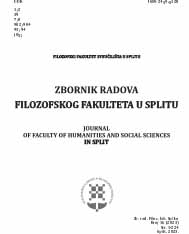FACCIAMO LE ORE PICCOLE O ANDIAMO A LETTO CON LE GALLINE? LO STUDIO DELL’ANTONIMIA FRASEOLOGICA
FACCIAMO LE ORE PICCOLE OR ANDIAMO A LETTO CON LE GALLINE? A STUDY OF PHRASEOLOGICAL ANTONYMY
Author(s): Antonia Luketin Alfirević, Lucija JukićSubject(s): Language and Literature Studies, Semantics, Phraseology
Published by: Filozofski fakultet, Sveučilište u Splitu
Keywords: semantic relationships; antonymy; phraseological antonymy; Italian phraseology; phraseological units;
Summary/Abstract: One of the main mechanisms of the human mind is the association of contrary concepts. Consequently, even the lexicon of a certain language contains lexemes of opposite or antonymous meanings. The study of the relationships between different lexical units, including the semantic relationship of antonymy, is the task of lexical semantics. This contribution aims to analyse phraseological antonymy. Starting from theoretical premises on antonymy, particularly those which refer to the oppositional relationships in phraseology, examples of antonymic pairs of phraseologisms have been extracted from various lexicographic sources. The aim was to analyse the paradigmatic relations of antonymy which are affected through the contrast of meaning of one or more lexemes in the phraseological units, or through the opposition of the entire meanings of expressions. The classification of antonymic phraseological units is also based on the aforementioned criteria which follows the model proposed by Ljiljana Šarić (2007), which distinguishes three categories of phraseologisms of opposite meaning. The first group consists of expressions which differ in only one lexical component (nascere sotto una buona stella – nascere sottouna cattiva stella), the second group contains the examples of phraseologisms that differ in two or more components (valere un occhio della testa – non valere un ficoseco), while the third category contains those phraseological units which do not have the opposite components in their structure, although their meaning is opposite (farele ore piccole – andare a letto con le galline). The corpus of phraseologisms and the subdivision of examples on the basis of pre-established criteria affirmed a significant presence of the relationships of opposite meaning between different phraseolo different phraseological units.
Journal: Zbornik radova Filozofskog fakulteta u Splitu
- Issue Year: 2023
- Issue No: 16
- Page Range: 43-58
- Page Count: 16
- Language: Italian

